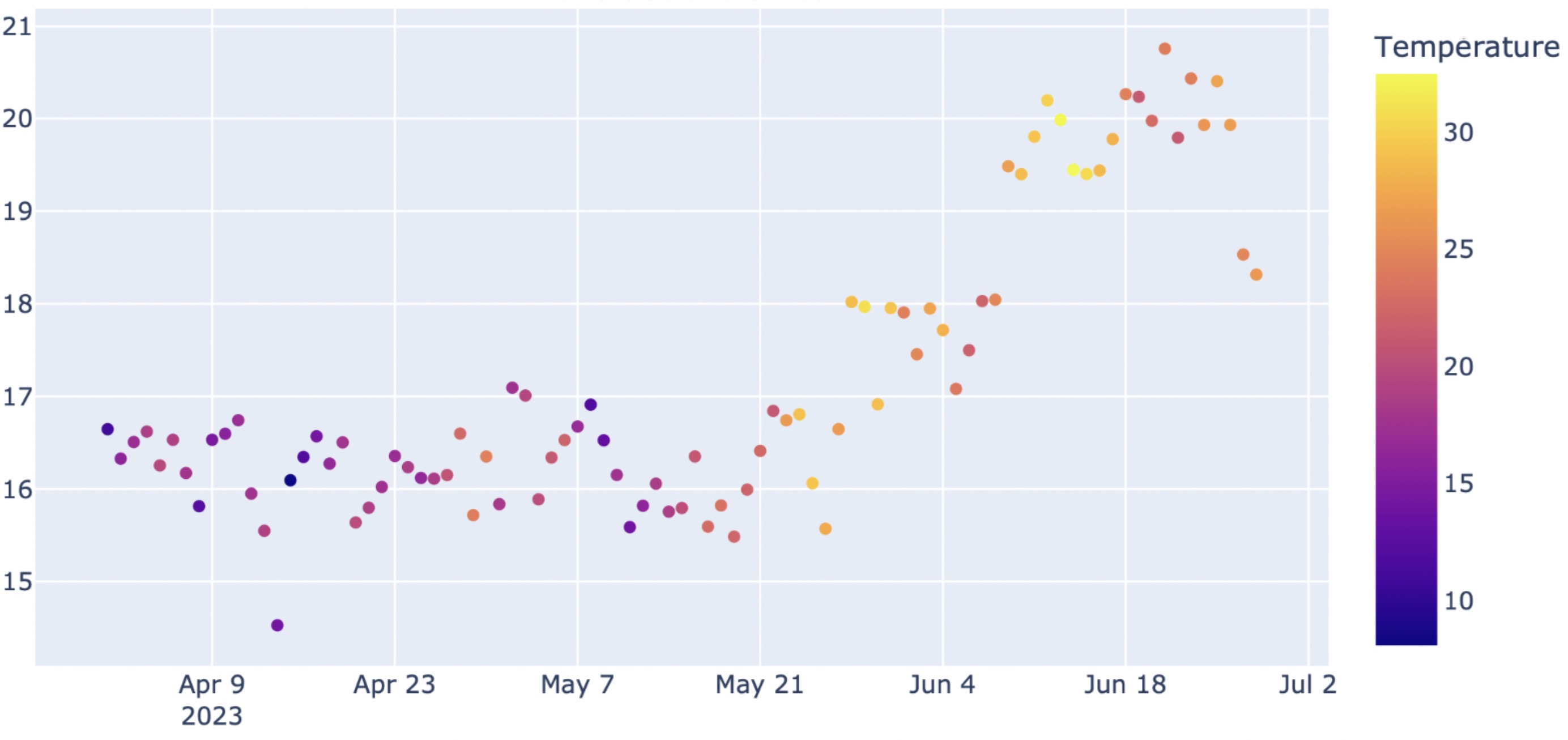Climate change, with its escalating temperatures, is an increasing global concern. Invoxia, the company behind the advanced Smart Dog Collar, has delved into the unique data collected by this connected health collar to gauge the impact of soaring temperatures on dogs. They examined data from 100 dogs and the results unambiguously reveal the toll that heat takes on their well-being, with a significant rise in resting respiratory rate, especially as we have only entered the early days of summer.
This issue is particularly pronounced in brachycephalic dogs, notorious for their breathing problems, such as French Bulldogs and Pugs, which are currently in vogue.

Climate Change, Everyone’s Business #
Summers are becoming increasingly hot, often surpassing historical averages. This June in particular set heat records, with the European Copernicus service reporting the highest ever recorded global average temperatures for early June. This rise in temperature affects not just humans, but our canine companions as well, particularly certain individuals known to have breathing difficulties and be highly heat sensitive, like flat-nosed or brachycephalic dogs and cats.
Climate Change Impact on Brachycephalic Dogs: Increased Vulnerability #
Invoxia’s in-depth study of the effects of high temperatures on 100 dogs, using precise biometric data collected by the Smart Dog Collar over several months, provides further insights. A graph representing this data clearly shows significant changes in average dog breathing rates in Europe, in relation to date and maximum daily temperatures. There is an average increase of over 20% in respiratory rates between April and June during periods of intense heat.

At the same time, there has been a rising demand for brachycephalic dog breeds in recent years, with French Bulldogs among the most popular in France and the United States. However, breeding standards favoring certain aesthetic traits conflict with the welfare and health of these breeds. Over-selection for these traits, for the purpose of breeding and dog shows, has resulted in many “hypertyped” individuals that suffer from a multitude of health issues, such as narrow nostrils, sunken noses, and severe respiratory problems due to excess tissue in the skull. This is known as “Brachycephalic Obstructive Airway Syndrome” and often requires expensive, risky surgery to remove some of this tissue to clear the airways.
These breeds are particularly vulnerable to high temperatures: their narrower airways and less effective cooling ability make them more susceptible to heat’s harmful effects. Their short noses limit their ability to inhale sufficient air to cool down, and their protruding tongues do not allow for adequate evaporation of saliva, which is a natural cooling mechanism for dogs. As a result, they are more prone to heat stroke, sunstroke, respiratory distress, and dehydration during heatwaves, seriously jeopardizing their well-being and health.
Rising temperatures also pose problems for dogs with thick fur and those with undiagnosed health issues, such as heart conditions, which affect about 10% of dogs.
Dr. Valérie Chetboul, head of the Alfort cardiology unit and expert in cardiopathy screening, comments:
Know moreDogs regulate their body temperature primarily through breathing (unlike humans, dogs hardly sweat). Thus, when the ambient temperature rises, a dog’s respiratory rate increases (known as thermal polypnea). Simultaneously, the heart rate also increases. This can be especially detrimental if the animal already has a heart or respiratory condition, not to mention the risk of heat stroke.
Essential Precautions to Protect Brachycephalic Dogs in Hot Weather #
- Ensure your dog has access to fresh water at all times.
- Avoid walks during the hottest times of the day.
- Monitor for overheating signs like rapid breathing, excessive salivation, and lethargy.
- Moisten their nose or paws with a damp towel.
- Never leave your dog locked in a car, even in the shade.
- Monitor your brachycephalic dog’s weight as it can impact their temperature regulation.
- Consult a veterinarian if there are concerning symptoms.
- Use an health tracking app like RespiDog to track your dog breathing rate.
- Use a connected biometric collar like the Invoxia Minitailz to monitor your dog’s breathing rate and heart rate in real-time, night and day, and receive alerts if there are any anomalies.
The Smart Dog Collar and Minitailz have made it possible to collect heart rate and respiratory frequency data on a large scale, simply and non-invasively. Invoxia plans to publish a series of studies based on this real-life data to help promote canine health and well-being.
About Invoxia #
Invoxia is a leader in connected objects with integrated AI. The company designs and markets a range of innovative trackers, including pet-focused products. Discreet, lightweight, and with patented technology, Invoxia’s Smart Dog Collar is the first intelligent biometric collar capable of measuring a dog’s respiratory and heart health and tracking their movements in real-time for several weeks. Elegant and comfortable, this preventive health tool allows early detection of diseases even before symptoms appear.

